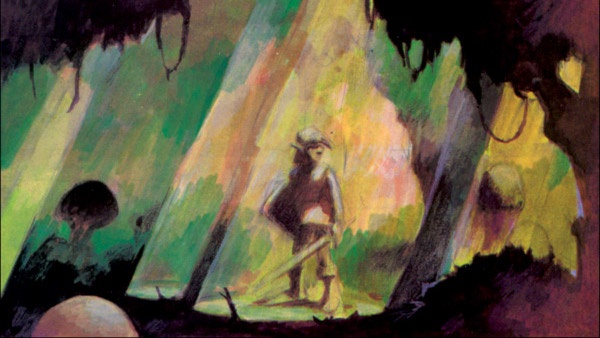Welcome to Maid Spin, the personal website of iklone. I write about about otaku culture as well as history, philosophy and mythology.
My interests range from anime & programming to mediaevalism & navigation. Hopefully something on this site will interest you.
I'm a devotee of the late '90s / early '00s era of anime, as well as a steadfast lover of maids. My favourite anime is Mahoromatic. I also love the works of Tomino and old Gainax.
To contact me see my contact page.

Things invariably get worse. This sentiment has been common across every generation since time immemorial. Once we reach adulthood it seems we all come to an individual realisation that everything around us is going downhill and there's nothing we can do to stop it. We all look back to our youth and see it as a halcyonic age, a peak from which "the world" has fallen, be that society, culture, the economy, the climate, politics, art or the number of potholes in roads. Its hard to see past the emotion to realise that this must a paradox. When we look back at history in broad strokes we see a more sinusoidal version of time over which the fortunes of mankind ebb and flood like tides rather than cascading down like a waterfall into the abyss. The common view of history as set out by the results of the application of the scientific and historic methods in fact rather portend a most definite upwards trend. The ascendency of humanity from apes to brutes to civilisation, or from a chaotic anarchy in which our lives were "solitary, poor, nasty, brutish and short" to the enlightened ordered society in which we supposedly live now. There are of course other lenses through which to view the world that reject the positive correlation to time, as I began to describe once upon a time in this article (maybe I'll continue it one day), but the "progressive" view of history has broadly been the zeitgeist of Western thought since at least the industrial revolution. So how can we hold these two opposing truths? That the world is in a consistent state of improvement in the long term but deterioration in the short term. This is the "Paradox of Nostalgia".
For a long time an odd little website has sat deep in one of my bookmark folders on my browser, I don't think I've visited it once in over a decade but occasionally I am reminded of its existence when searching for something else and that has been enough to keep its premise alive in my memory. First introduced to me via a V-Sauce video circa 2010, the webpage "fallingfalling.com" displays a psychedelic background of ever-collapsing squares along with a horrible noise which seems to fall in pitch forever. This noise is called a "Shepard Scale" and is an auditory illusion where several tones are superimposed upon eachother, with each individually decreasing in pitch and gradually fading out before fading back in at a higher pitch. This loop creates the illusion that the overall pitch of the sound seems to decrease endlessly, which is very confusing (to my brain at least) and gives one a sickly feeling akin to vertigo or a head-rush. The illusion was developed by the eponymous Dr Roger Shepard in 1964, and went on to garner some notoriety (within the niche world of avant-garde harmonics) due to its use in John Lennon's "I Am the Walrus" in 1967 (You can hear it most obviously as the repeating overtone post-crescendo from 4:28 until the end). The disarming and altogether nauseating nature of the sound is an interesting illusion, because it is quickly identifiable as an impossibility, but basically impossible to "see past" like many optical illusions are. Despite us understanding what trickery is at play, its still impossible to prevent the illusion from working.
 ^The classic barberpole
^The classic barberpole
The visual version of this trick is the barberpole; an illusion so simple and striking it has become the de facto brand for an entire industry. But unlike a Shepard Scale, one can see past the barberpole for what it truly is. I find it possible to "switch" between seeing the stripes moving upwards, and moving leftwards (which is what's actually happening). More broadly such illusions are known as "Strange Loops", domains in which by moving in the same direction, one will seemingly impossibly end up back at the start. Escher's endless stairs in "Ascending & Descending" are a nice example, but more disorientatingly I find the recurring "Lost Woods" of the Zelda series to be a more indicative of the unnatural feeling of experiencing such places. To navigate the Lost Woods one must know the correct route through which to travel, which consist of clearings connected by pathways; one can travel forever for miles without getting anywhere, but following the path backwards just once will dump you out back where you started. Like an ouroboros these worlds snake back on themselves in ways difficult to comprehend. Even a simple globe can play this trick on us, if you travelled in one direction right now for 24,900 miles and you will eventually reach your starting point after all.
The reason that Shepard Scales work is because our brains subconsciously single out individual tones from the overall cacophony and hear them get lower and lower, but don't perceive when they fade out and fade back in as they're too quiet. This automatic shift in focus between the most relevant tones may be able to explain the described Paradox of Nostalgia. As humans we are unavoidably "of the world", as children we grow up surrounded by it and thus take on its properties and values. More often than not the malaise of society imprints onto us our core values, or at least increases in our mind the importance of the values which the current world sees as most important. And yet the world turns; the cultural values of 2005 are not those of 2025, and that which was held to the utmost importance then is not so now. It is natural for instances of creation to decay over time, a house will never be as sturdy as when it was first built after all, and so the great monuments of culture from our youth will inevitably crumble and decay as we grow older. And while I don't think our minds calcify once we become adults, our youths certainly play an outsized role in our fundamental "self", being a framework around which we can craft ourselves until our deathbed. Just like a Shepard Scale, every passing generation focuses on those tones which are the loudest in their era and sees that they are in decline; they don't see the new tones until they are already in-place and have themselves started to decay. And so we create the absurd vision of a world in a continuous state of simultaneous improvement and deterioration, both cursing and eagerly anticipating the slow march of time in a single breath. It's hard to tell if the world is moving up or down, but I know for sure that it spins.